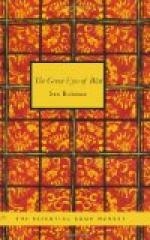Never shall I forget Sir Burnham’s change of countenance. He tottered, a stricken man. With a sentence of ten words I had won my battle. Upon the details of the arrangement which presently was come to between us, I need not linger. For this statement is intended not as a defense—for what I have done I pay the price—but as a resume of this crowning inquiry of my scientific career.
* * * * *
At this point the speaker was seized with an alarming spasm of pain. His black eyes opened widely and his face became contorted with agony.
I sprang to his assistance. For, villain self-confessed though he was, humanity would not allow of any man’s witnessing unmoved such paroxysms in a fellow creature.
But, ere I could reach his side, Damar Greefe, clenching his teeth and clutching at the chair-arms so that his knuckles gleamed in the lamp-light like white marbles, turned his glance upon me, and:
“Be seated, sir,” he whispered. “I desire you to be seated.”
Something repellent, yet something powerful, there was in word and glance. Gatton, who also had sprung forward, hesitated. Damar Greefe raised one hand from the chair-arm and waved to us to return to our chairs. Exchanging wondering glances, we both obeyed.
Thereupon, the Eurasian doctor, whose high, bony forehead was dewed with a deathly perspiration and whose hawk-face had assumed an indescribable leaden hue, drew from his pocket a heavy gold watch (his every movement intently followed by the alert Inspector) and consulted it. His hand shook wildly as he returned the timepiece to its place. Then:
“I must hasten,” he said hoarsely. “I have—only nineteen minutes....” Gatton looked at me questioningly, but I could only shake my head. The significance of the Eurasian’s words escaped me entirely; but as Damar Greefe begun, slowly and with palpable effort, to speak again, I saw a queer expression stealing over the face of the watchful Gatton.
CHAPTER XXVII
STATEMENT OF DR. DAMAR GREEFE (CONCLUDED)
A month later I found myself installed at the Bell House, a property belonging to the Friar’s Park estate, and in the commodious apartments of this establishment I had ample room for the accommodation of my library and my priceless specimens. Nahemah was likewise an inmate of the Bell House; but recognizing the precarious nature of my tenure, I had taken the precaution of retaining the suburban villa to which I have already referred; its modest rental proving no tax upon my greatly increased resources.
Blackmail, I hear you exclaim! And, so, if you wish, you may construe my behavior, since I reply—“Science first, science last!” To have been deprived of the means to pursue my experiments at this time would have been, I believed, to impoverish the world. For not even science could reveal to me that my life’s work was destined to perish amid the ashes of the Bell House.




